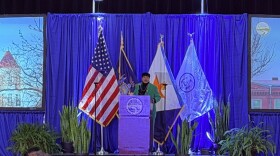State Comptroller Tom DiNapoli says $5 billion in extra money that New York is reaping from bank settlements should not be viewed as a surplus, and should not be spent as though there will be more money coming in the future.
“I wouldn’t call it a surplus,” DiNapoli said. “It’s really more of a windfall.”
And so the comptroller says it should not be used for recurring expenses, like tax cuts or increased school aid, as some legislators have suggested.
“If you use some of that money for school aid today, you’re going to have a hole down the road,” DiNapoli warned. “You’ll just get back to creating out-year budget gaps, which caused so many of our problems in past years.”
According to the comptroller’s projections, the state still has a structural deficit of nearly $2 billion for the upcoming budget year, though Gov. Andrew Cuomo has promised to hold spending increases to below two percent to prevent that from happening.
Cuomo and legislative leaders have all said they want the $5 billion to be kept separate from the budget and placed in an infrastructure fund. DiNapoli says that would be a smart use of the money, though it could also be used to pay down the state’s high debt or create a trust fund to pay for retiree health insurance costs.
The governor and lawmakers have not yet defined what exactly they mean by infrastructure. Projects range from economic development aid for troubled regions, to funding the $4 billion new Tappan Zee Bridge on the New York State Thruway over the Hudson River. Cuomo has not yet detailed how he will pay for the bridge, which is already under construction.
DiNapoli, who has had an increasingly tense relationship with the governor, criticized Cuomo for not being more forthcoming.
“That is a key missing piece,” DiNapoli said. “We should have had that information already.”
The comptroller is currently auditing the Cuomo administration’s contracts with advertising firms that were paid millions of dollars in state funds to air ads promoting New York’s Open for Business campaign, and a tax abatement program to attract new start-up businesses. Critics, including Cuomo’s opponent in the 2014 elections, says the ads were political in nature and aimed at boosting the incumbents governor’s standing.
DiNapoli would not say whether he thinks the ads were an appropriate use of taxpayer money, and does not expect the audit to be completed before the end of the year, but he says it will be ready soon.
“Stay tuned,” he said.
DiNapoli calls for commission to determine if lawmakers get pay raises
The state comptroller also says a commission should be set up to evaluate whether New York lawmakers should get a salary increase next year.
DiNapoli says instead of state lawmakers voting later this month to raise their own pay beginning in January, they should instead let an independent body make that decision.
“It would make the most sense to have a commission or someone take a look at that question, it’s probably something that should have been done a long time ago,” said DiNapoli, who says it’s preferable to resolving the matter in an end of the year horse trading session.
There’s been talk of a package of bills that would include pay raises for lawmakers as well as a minimum wage increase, and perhaps a plan for more charter schools or even other unrelated issues like the Dream Act, which would give college aid to children of immigrants.
DiNapoli was previously an assemblyman for several years. He says it’s been a long time since legislators have had a pay increase -- the last was in 1999 -- and is not an unreasonable area of discussion.
Cuomo and the legislature have not yet decided whether to hold a special session. If they do it will need to happen by mid-December.








